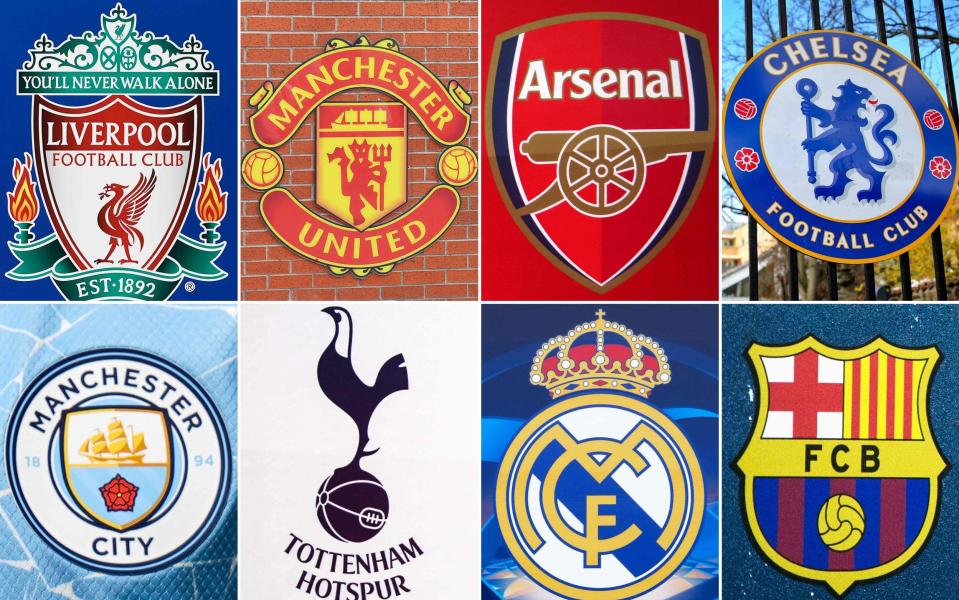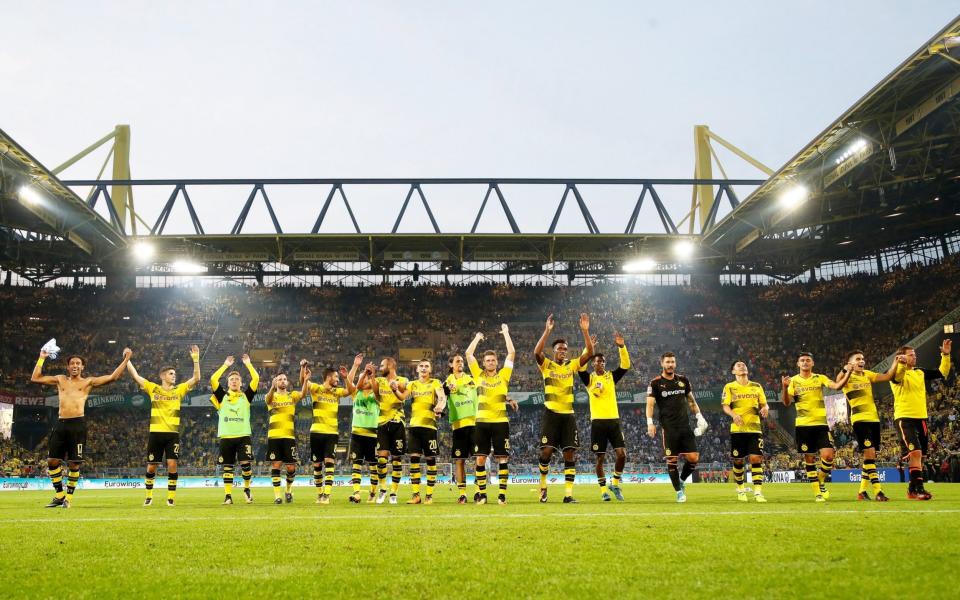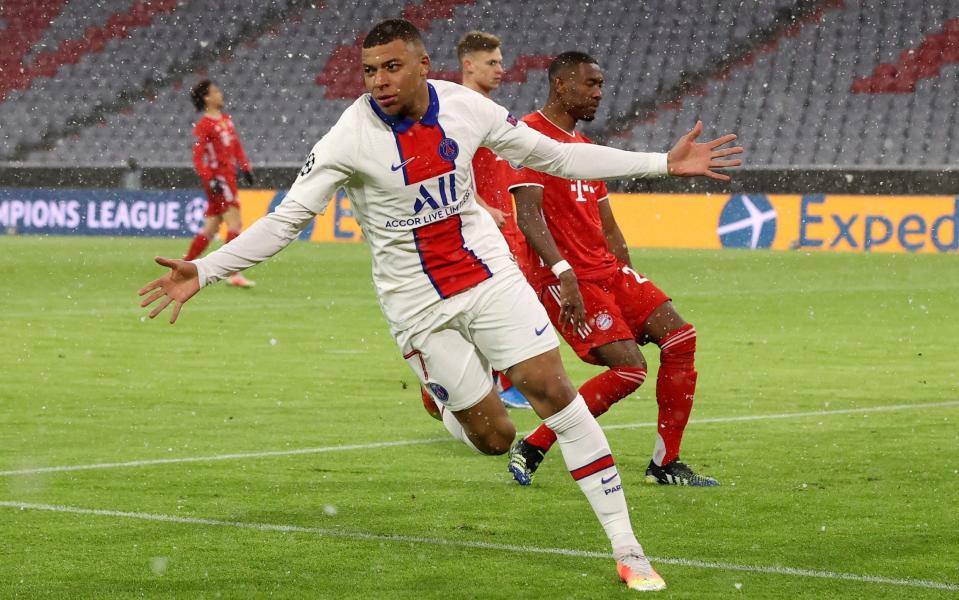European Super League: will it happen and can it be stopped?

The 12 rebels behind the money-grabbing Super League launch have enraged the rest of football, the Prime Minister and even royalty - but will it really happen? Here Telegraph Sport explores the most likely scenarios in the tumultuous weeks ahead:
1. It happens as they want it to
Telegraph Sport understands Chelsea and Manchester City had been reluctant to go ahead with the plans as recently as last week, but the remaining 10 clubs are said to be "utterly determined to get this done". Legal letters issued to Uefa on Monday were the clearest evidence that the breakaway announced the night before was more than a 11th hour idle threat over Champions League reforms. The plans will go ahead if domestic competitions do not have the nerve to kick them out of their competitions. The fear amongst the remaining 14 clubs in the Premier League will be that the so-called "big six" launch their own English league. The Super League gang backed by vast wealth is confident an expensively assembled legal team can win their day in court, and eventually persuade governments that the breakaway is non-negotiable. The announcement of a fan-led review led by the former sports minister Tracey Crouch will be countered by relentless lobbying by the new competition in the coming weeks - the sweetener on offer is £10billion in solidarity payments over 23 years.
2. It happens and they leave domestic football behind
The 14 Premier League teams were being briefed by lawyers on Tuesday at a key meeting to decide the rebels' fate. A statement is set to be released by the end of the day explaining whether the clubs are willing to press the nuclear button and boot the so-called "big six" out for their treachery. Sources close to the Super League are bullish, given the Premier League is set to put its domestic TV rights out for tender within weeks. If clubs and the league do go ahead, however, the exiles would eventually attempt to lure bigger Championship clubs, and form their own domestic competition. The Football Association and Uefa has warned it will not sanction a breakaway, meaning that players and clubs could no longer compete in other official competitions. But such a move could cause the collapse of the Premier League and English Football League as we know it. Broadcast values of both would tumble, and the smaller top tier clubs who rejected Project Big Picture last October would end up with a fate even worse.
3. They're talked out of it and bargained with
The Champions League reforms from 2024 have been signed off now, but sources close to talks say commercial details have yet to be finalised. The most radical bargaining chip for Uefa will be to turn to private investment like the 12 rebels have done. As it stands, all money European competitions generate is through television rights, leading to annual distribution of around £3billion. There is potential for Uefa to increase that fund, and executives are known to be in talks over a £5.2billion cash injection from a London-based private investment firm as part of efforts to undermine the Super League's JP Morgan-backed fund. Centricus Asset Management is said to be discussing a six billion euro financing package, which would allow further reforms that could go beyond the "Swiss-system". Insiders say talks are at a very early stage, however, and Uefa is unlikely to be moved immediately from its current non-negotiable stance.
Domestically, the Premier League has a history of finding compromise positions to appease its biggest clubs. A model first offered up during Project Big Picture to give the clubs an even bigger slice of the current TV revenue system and a review of voting rights are options. The league is carrying out its own review of football governance, which could bring the rebels to the bargaining table.
4. They're punished by leagues, points deductions, relegations, bans and we have years of legal disputes
Domestic leagues will threaten relegations and points deductions, but legal experts say the existing competitions will see their best chance of victory through the courts. Legal warnings have already been exchanged between the new competition, Uefa and Fifa, with cases looming at Switzerland's Court of Arbitration for Sport and the law courts.
Katarina Pijetlovic, a reader in sports law from Manchester Metropolitan University, warned that breakaway clubs “are taking an absolutely massive risk” and that the project could be stopped through legal means which could take years. Fifa has previously threatened bans for international tournaments, but has backed away from such warnings in recent days. Uefa, however, will use every punishment at its disposal to delay the scheme which would ruin its Champions League.
Article 49 of the Uefa Statutes says the governing body has "sole jurisdiction to organise or abolish international competitions in Europe in which Member Associations and/or their clubs participate". However, interim orders from the Super League to prevent Uefa, Fifa or national associations from implementing threats could happen quickly, allowing the Super League to start before any decision to approve or disapprove it. Either way, Pijetlovic says, “it’s a massive mess legally."
5. The voice of opposition becomes so strong they climb down for now and something re-emerges in a few years
The Super League gathered pace after the collapse of Project Big Picture, the domestic revolution first unearthed by Telegraph Sport. Chelsea and Manchester City took the most persuading to sign up and the 12 rebels are increasingly isolated by German and French teams turning their backs on the scheme. The competition hired an ex-Downing Street advisor to help land the announcement, but it's unlikely the clubs anticipated even Prince William to weigh in amid global disgust at their plans. Anger levels are unprecedented across the game, and it's possible that some of the clubs start to lose their nerve, forcing the more committed members into an eventual suspension of the plan.
Don't expect an immediate climbdown, however. Florentino Perez, the Real Madrid president, has for the last decade been the most outspoken proponent, and his announcement as chairman of the new competition rewards his central role as an architect. The American ownerships at Manchester United and Liverpool appear equally sold too on the prospect of an NBA or NFL-style league, where franchise owners enjoy reliable profits and the valuation of teams rise steadily over time. If it does fall apart, you can guarantee the secret talks will start up again immediately.
6. They're talked out of it and there's lasting change in how football is run
As it stands, this best-case-scenario appears the least likely, but it's the position that Governments, the grass-roots game and, most of all, fans want. There is desperation within English football and at Whitehall for a more effective governance structure to redistribute the current bottleneck of vast riches. Former FA chairman David Bernstein, the Premier League and now the Government are all championing separate reviews to safeguard the stricken pyramid. Clearly, the actions of the owners of England's so-called "big six" in recent days illustrate they are also committed to a shake up of sorts. Finding consensus without offering the richest clubs even more wealth appears to be football's impossible dream.
So - can it be stopped?
The football authorities and Government have declared war on The Super League, vowing to do whatever it takes to stop it. Here are the measures under consideration.
Throwing the Big Six out of the Premier League
The 14 other Premier League clubs will meet today to decide how to react to the Super League. There have been calls for the Big Six to be expelled from the competition, which would usually require a three-quarters majority. That could be got round using another rule banning clubs entering rebel competitions, something for which they can be sanctioned. Any sanction would be fought by the Big Six, while expelling them from the Premier League altogether would also risk them setting up a rival domestic league and inviting other clubs to join them. Another option is to use the voting power of the 14 to change the Premier League rules in other areas to hurt the Big Six – although this would again risk a domestic breakaway.
Throw them out of the Champions League and Europa League
This appears a much more credible threat, with Uefa president Aleksander Ceferin confirming plans to do just that – potentially even from this season’s semi-finals. Executive committee member Jesper Moller later said he expected their expulsion on Friday. Again, expect anything like that to be contested legally by the clubs involved. Also, even if it survived a legal challenge, Uefa would need to work out how to finish the Champions League and Europa League, possibly by drafting in beaten clubs.
Bring in the 50+1 rule
Oliver Dowden, the Culture Secretary, revealed the German model of majority supporter ownership would be looked at by the Government’s fan-led review of English football. But the German model exists through agreement of the clubs and it is hard to see the owners of the 14 other Premier League clubs backing this. Also, Government interference in football is banned by Fifa, which may decide imposing the 50+1 rule to be a step too far.

Ban the Big Six’s players from the World Cup and European Championship
Designed to fuel player opposition to the Super League, this would be met by a legal challenge from world players’ union FifPro as well as the clubs involved. Even if it survived such a challenge, would the likes of the Football Association really want England to play Euro 2020 without their best players? Ceferin owes his presidency to the votes of national associations.
Outlaw the Super League
Dowden said using existing competition law to outlaw a largely-closed Super League or fast-tracking new legislation designed to do so was among the options being considered by the Government. Anything like that would need to survive a legal challenge and the 12 Super League clubs are said to be very confident of their position on this front.
Stop the Big Six staging matches
Government cooperation is required for any mass event to be staged in this country. Games cannot take place without the likes of safety certificates, policing and plans around transportation. Ministers could make it impossible for a stadium to operate.
Stop them signing foreign players
Again, the granting of work permits are within the Government’s gift and Britain leaving the European Union has merely widened their usage. Also, Fifa could ban non-Super League clubs from selling players to Super League teams. This would potentially stop Kylian Mbappe and Erling Haaland moving to England or Spain – at least temporarily.

Hit them in the pocket
Dowden refused to rule out cutting Super League clubs off from public funds – Arsenal and Tottenham Hotspur both currently have taxpayer-backed loans – or changing the tax status on image rights.

